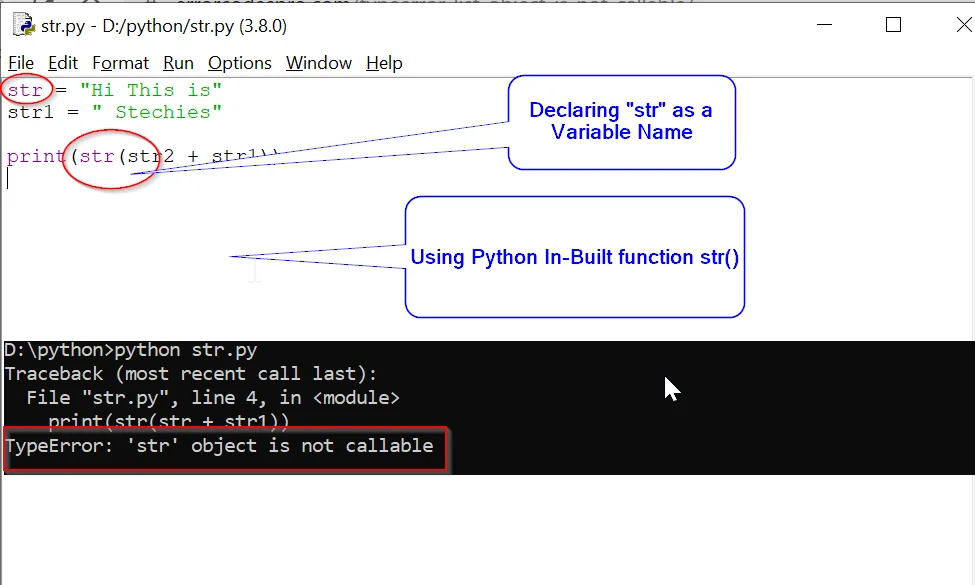You are looking for information, articles, knowledge about the topic nail salons open on sunday near me str object cannot be interpreted as an integer on Google, you do not find the information you need! Here are the best content compiled and compiled by the https://chewathai27.com/to team, along with other related topics such as: str object cannot be interpreted as an integer Input int Python, invalid literal for int() with base 10:, List’ object cannot be interpreted as an integer, Datetime timedelta object cannot be interpreted as an integer, Bytes object cannot be interpreted as an integer, A bytes-like object is required, not ‘str, Int’ object is not subscriptable, String to byte Python
What does STR object Cannot be interpreted as an integer?
The Python “TypeError: ‘str’ object cannot be interpreted as an integer” occurs when we pass a string to a function that expects an integer argument. To solve the error, pass the string to the int() constructor, e.g. for i in range(int(‘5’)): . Here is an example of how the error occurs. Copied!
What is a str object?
In Python, the str() function is used for converting a certain value into a string. It takes an object as an argument and converts it into a string. As str is the name of a pre-defined function in Python and is a reserved keyword, it cannot be used anywhere else.
Why is str not working in Python?
This is because strings are not functions. To call a function, you add () to the end of a function name. This error commonly occurs when you assign a variable called “str” and then try to use the str() function. Python interprets “str” as a string and you cannot use the str() function in your program.
What does STR object does not support item assignment mean?
The Python “TypeError: ‘str’ object does not support item assignment” occurs when we try to modify a character in a string. Strings are immutable in Python, so we have to convert the string to a list, replace the list item and join the list elements into a string. Here is an example of how the error occurs.
How do I fix str object is not callable?
The Python “TypeError: ‘str’ object is not callable” occurs when we try to call a string as a function, e.g. by overriding the built-in str() function. To solve the error, make sure you’re not overriding str and resolve any clashes between function and variable names. Here is one example of how the error occurs.
How do you convert string to int in Python?
To convert a string to integer in Python, use the int() function. This function takes two parameters: the initial string and the optional base to represent the data. Use the syntax print(int(“STR”)) to return the str as an int , or integer.
What is str object in Python?
The str() function converts the specified value into a string.
What does STR means in Python?
Python has a built-in string class named “str” with many handy features (there is an older module named “string” which you should not use). String literals can be enclosed by either double or single quotes, although single quotes are more commonly used.
Can’t multiply sequence by non int of type STR meaning?
Conclusion. The “TypeError: can’t multiply sequence by non-int of type ‘str’” error occurs if you try to multiply two string values together. You can fix this problem by ensuring that you either multiply two numerical values together or that you only multiply a string by an integer.
Can only concentrate Str not int to str?
The error “typeerror: can only concatenate str (not “int”) to str” is raised when you try to concatenate a string and an integer. To solve this error, make sure that all values in a line of code are strings before you try to concatenate them.
What is a integer in Python?
Int, or integer, is a whole number, positive or negative, without decimals, of unlimited length.
How do you convert an int object to str implicitly?
This error message Can’t convert ‘int’ object to str implicitly is clear, when concatenating strings with integers – you can’t directly stick together a string and an integer. So, in order to resolve this problem, you have to explicitly parse the integer to a string by the str() built-in function .
How do I convert a string to a list in Python?
To convert string to list in Python, use the string split() method. The split() is a built-in Python method that splits the strings and stores them in the list.
How do you replace a string in Python?
Python String replace() Method
The replace() method replaces a specified phrase with another specified phrase. Note: All occurrences of the specified phrase will be replaced, if nothing else is specified.
How do you change a string letter in Python?
replace() method helps to replace the occurrence of the given old character with the new character or substring. The method contains the parameters like old(a character that you wish to replace), new(a new character you would like to replace with), and count(a number of times you want to replace the character).
How do you make an int object Subscriptable?
The TypeError: ‘int’ object is not subscriptable error occurs if we try to index or slice the integer as if it is a subscriptable object like list, dict, or string objects. The issue can be resolved by removing any indexing or slicing to access the values of the integer object.
What does int object is not Subscriptable?
Python TypeError: ‘int’ object is not subscriptable
This error occurs when you try to use the integer type value as an array. In simple terms, this error occurs when your program has a variable that is treated as an array by your function, but actually, that variable is an integer.
Can only concatenate string Python?
The Python “TypeError: can only concatenate str (not “list”) to str” occurs when we try to concatenate a string and a list. To solve the error, access the list at a specific index to concatenate two strings, or use the append() method to add an item to the list.
Is not iterable Python?
If you are running your Python code and you see the error “TypeError: ‘int’ object is not iterable”, it means you are trying to loop through an integer or other data type that loops cannot work on. In Python, iterable data are lists, tuples, sets, dictionaries, and so on.
python – TypeError: ‘str’ object cannot be interpreted as an integer – Stack Overflow
- Article author: stackoverflow.com
- Reviews from users: 20934
Ratings
- Top rated: 3.9
- Lowest rated: 1
- Summary of article content: Articles about python – TypeError: ‘str’ object cannot be interpreted as an integer – Stack Overflow A simplest fix would be: x = input(“Give starting number: “) y = input(“Give ending number: “) x = int(x) # parse string into an integer y … …
- Most searched keywords: Whether you are looking for python – TypeError: ‘str’ object cannot be interpreted as an integer – Stack Overflow A simplest fix would be: x = input(“Give starting number: “) y = input(“Give ending number: “) x = int(x) # parse string into an integer y …
- Table of Contents:
8 Answers
8
Not the answer you’re looking for Browse other questions tagged python types or ask your own question

TypeError: ‘str’ object cannot be interpreted as an integer
- Article author: bobbyhadz.com
- Reviews from users: 28461
Ratings
- Top rated: 3.5
- Lowest rated: 1
- Summary of article content: Articles about TypeError: ‘str’ object cannot be interpreted as an integer The Python “TypeError: ‘str’ object cannot be interpreted as an integer” occurs when we pass a string to a function that expects an integer … …
- Most searched keywords: Whether you are looking for TypeError: ‘str’ object cannot be interpreted as an integer The Python “TypeError: ‘str’ object cannot be interpreted as an integer” occurs when we pass a string to a function that expects an integer … The Python TypeError: ‘str’ object cannot be interpreted as an integer occurs when we pass a string to a function that expects an integer argument. To solve the error, pass the string to the `int()` constructor, e.g. `for i in range(int(‘5’)):`.
- Table of Contents:

TypeError: ‘str’ object cannot be interpreted as an integer
- Article author: bobbyhadz.com
- Reviews from users: 8551
Ratings
- Top rated: 4.7
- Lowest rated: 1
- Summary of article content: Articles about TypeError: ‘str’ object cannot be interpreted as an integer Updating …
- Most searched keywords: Whether you are looking for TypeError: ‘str’ object cannot be interpreted as an integer Updating The Python TypeError: ‘str’ object cannot be interpreted as an integer occurs when we pass a string to a function that expects an integer argument. To solve the error, pass the string to the `int()` constructor, e.g. `for i in range(int(‘5’)):`.
- Table of Contents:

Resolve TypeError: ‘str’ object is not callable in Python
- Article author: www.stechies.com
- Reviews from users: 3897
Ratings
- Top rated: 4.9
- Lowest rated: 1
- Summary of article content: Articles about Resolve TypeError: ‘str’ object is not callable in Python Updating …
- Most searched keywords: Whether you are looking for Resolve TypeError: ‘str’ object is not callable in Python Updating This tutorial explains How to resolve Typeerror: ‘str’ object is not callable in Python. To resolve this error, you need to change the name of the variable whose name is similar to the in-built function str() used in the code.Python, Tutorial Resolve TypeError: ‘str’ object is not callable in Python Resolve TypeError: ‘str’ object is not callable in Python
- Table of Contents:
Cause of TypeError ‘str’ object is not callable in Python
How to Resolve typeerror ‘str’ object is not callable

Python typeerror: ‘str’ object is not callable Solution | Career Karma
- Article author: careerkarma.com
- Reviews from users: 25964
Ratings
- Top rated: 3.4
- Lowest rated: 1
- Summary of article content: Articles about Python typeerror: ‘str’ object is not callable Solution | Career Karma Updating …
- Most searched keywords: Whether you are looking for Python typeerror: ‘str’ object is not callable Solution | Career Karma Updating On Career Karma, learn about the Python typeerror: ‘str’ object is not callable error, how the error works, and how to solve the error.
- Table of Contents:
The Problem typeerror ‘str’ object is not callable
Example Scenario Declaring a Variable Called “str”
Example Scenario String Formatting Using %
Conclusion

TypeError: ‘str’ object does not support item assignment
- Article author: bobbyhadz.com
- Reviews from users: 24354
Ratings
- Top rated: 3.4
- Lowest rated: 1
- Summary of article content: Articles about TypeError: ‘str’ object does not support item assignment Updating …
- Most searched keywords: Whether you are looking for TypeError: ‘str’ object does not support item assignment Updating The Python TypeError: ‘str’ object does not support item assignment occurs when we try to modify a character in a string. Strings are immutable in Python, so we have to convert the string to a list, replace the list item and join the list elements into a string.
- Table of Contents:

TypeError: ‘str’ object cannot be interpreted as an integer | Career Karma
- Article author: careerkarma.com
- Reviews from users: 48546
Ratings
- Top rated: 4.7
- Lowest rated: 1
- Summary of article content: Articles about TypeError: ‘str’ object cannot be interpreted as an integer | Career Karma The “TypeError: ‘str’ object cannot be interpreted as an integer” error is raised when you pass a string as an argument into a range() statement … …
- Most searched keywords: Whether you are looking for TypeError: ‘str’ object cannot be interpreted as an integer | Career Karma The “TypeError: ‘str’ object cannot be interpreted as an integer” error is raised when you pass a string as an argument into a range() statement … The Python TypeError: ‘str’ object cannot be interpreted as an integer error is raised when you use a string in a range() statement. On Career Karma, learn how to fix this error.
- Table of Contents:
TypeError ‘str’ object cannot be interpreted as an integer
An Example Scenario
The Solution
Conclusion

Python TypeError: ‘str’ object cannot be interpreted as an integer Solution
- Article author: www.techgeekbuzz.com
- Reviews from users: 8069
Ratings
- Top rated: 4.3
- Lowest rated: 1
- Summary of article content: Articles about Python TypeError: ‘str’ object cannot be interpreted as an integer Solution The Python range method can only accept integer values as … …
- Most searched keywords: Whether you are looking for Python TypeError: ‘str’ object cannot be interpreted as an integer Solution The Python range method can only accept integer values as …
- Table of Contents:
Table of Content
Python issue TypeError ‘str’ object cannot be interpreted as an integer
Common Example Scenario
Conclusion
Get the latest tutorials and updates

Learn how to fix error: typeerror: ‘str’ object cannot be interpreted as an integer – ITtutoria
- Article author: ittutoria.net
- Reviews from users: 49009
Ratings
- Top rated: 3.6
- Lowest rated: 1
- Summary of article content: Articles about Learn how to fix error: typeerror: ‘str’ object cannot be interpreted as an integer – ITtutoria The cause: This error happens due to range() only accepts int values as parameters. … Outputs as below: … input returns a string ( in Python 2 ) … …
- Most searched keywords: Whether you are looking for Learn how to fix error: typeerror: ‘str’ object cannot be interpreted as an integer – ITtutoria The cause: This error happens due to range() only accepts int values as parameters. … Outputs as below: … input returns a string ( in Python 2 ) … Here is the program I run:x = input(“Give starting number: “)
y = input(“Give ending number: “)
for i in range(x,y):
print(i)Give starting number: 4
Give ending number: 13
4
…typeerrorLearn how to fix error: typeerror: ‘str’ object cannot be interpreted as an integer - Table of Contents:
ITtutoria
ITtutoria
Tutorial
Legal Stuff
Help
Follow

Python TypeError: str object cannot be interpreted as an integer | Python | cppsecrets.com
- Article author: cppsecrets.com
- Reviews from users: 35840
Ratings
- Top rated: 3.9
- Lowest rated: 1
- Summary of article content: Articles about Python TypeError: str object cannot be interpreted as an integer | Python | cppsecrets.com Python TypeError: ‘str’ object cannot be interpreted as an Integer … TypeError occurs when you made a function call or use an operator on inappropriate data … …
- Most searched keywords: Whether you are looking for Python TypeError: str object cannot be interpreted as an integer | Python | cppsecrets.com Python TypeError: ‘str’ object cannot be interpreted as an Integer … TypeError occurs when you made a function call or use an operator on inappropriate data … C++ and Python Professional Handbooks : A platform for C++ and Python Engineers, where they can contribute their C++ and Python experience along with tips and tricks. Reward Category : Most Viewed Article and Most Liked ArticleC++, Python, Programming, coding, C++ programming, Python programming, Django, Python projects, ALgorithms, Data STructures, cppsecrets, Tutorial, Projects, Articles, cplusplus,Algorithms,Python,Operating,System,OS,GDB,Linux,CPP,Handbook,Tricks,Codes,Programming,C++
- Table of Contents:

Python – TypeError: ‘str’ object cannot be interpreted as an integer – iTecNote
- Article author: itecnote.com
- Reviews from users: 8575
Ratings
- Top rated: 4.1
- Lowest rated: 1
- Summary of article content: Articles about Python – TypeError: ‘str’ object cannot be interpreted as an integer – iTecNote Python – TypeError: ‘str’ object cannot be interpreted as an integer. pythontypes. I don’t understand what the problem is with the code, it is very simple … …
- Most searched keywords: Whether you are looking for Python – TypeError: ‘str’ object cannot be interpreted as an integer – iTecNote Python – TypeError: ‘str’ object cannot be interpreted as an integer. pythontypes. I don’t understand what the problem is with the code, it is very simple …
- Table of Contents:

[Solved]’numpy.str_’ object cannot be interpreted as an integer in Python
- Article author: quizdeveloper.com
- Reviews from users: 41160
Ratings
- Top rated: 4.3
- Lowest rated: 1
- Summary of article content: Articles about [Solved]’numpy.str_’ object cannot be interpreted as an integer in Python str_’ object cannot be interpreted as an integer. Traceback (most recent call last): File “main.py”, line 8, in
print(range(subjects[ … … - Most searched keywords: Whether you are looking for [Solved]’numpy.str_’ object cannot be interpreted as an integer in Python str_’ object cannot be interpreted as an integer. Traceback (most recent call last): File “main.py”, line 8, in
print(range(subjects[ … I got an exception TypeError: ‘numpy.str_’ object cannot be interpreted as an integer in Python 3 when I was trying to loop some arrays and print out of them. - Table of Contents:
Related Q&A May You Like
Most Quizs Popular
Popular Tips
![[Solved]'numpy.str_' object cannot be interpreted as an integer in Python](https://quizdeveloper.com/images/faq-social.jpg)
See more articles in the same category here: Chewathai27.com/to/blog.
TypeError: ‘str’ object cannot be interpreted as an integer
This question already has answers here: How can I read inputs as numbers? (10 answers) Closed 2 years ago .
I don’t understand what the problem is with the code, it is very simple so this is an easy one.
x = input(“Give starting number: “) y = input(“Give ending number: “) for i in range(x,y): print(i)
It gives me an error
Traceback (most recent call last): File “C:/Python33/harj4.py”, line 6, in
for i in range(x,y): TypeError: ‘str’ object cannot be interpreted as an integer As an example, if x is 3 and y is 14, I want it to print
Give starting number: 4 Give ending number: 13 4 5 6 7 8 9 10 11 12 13
What is the problem?
TypeError: ‘str’ object cannot be interpreted as an integer
TypeError: ‘str’ object cannot be interpreted as an integer
TypeError: ‘str’ object cannot be interpreted as an integer #
The Python “TypeError: ‘str’ object cannot be interpreted as an integer” occurs when we pass a string to a function that expects an integer argument. To solve the error, pass the string to the int() constructor, e.g. for i in range(int(‘5’)): .
Here is an example of how the error occurs.
main.py Copied! my_num = ‘5’ for i in range ( my_num ) : print ( i )
We passed a string to the range() constructor which expects an integer argument.
To solve the error, pass the string to the int() constructor to convert it to an integer.
main.py Copied! my_num = ‘5’ for i in range ( int ( my_num ) ) : print ( i )
The error often occurs when getting user input using the built-in input() function.
main.py Copied! num = input ( ‘Enter your fav number: ‘ ) print ( num ) print ( type ( num ) ) for i in range ( num ) : print ( i )
The input function converts the data to a string and returns it.
To solve the error, pass the result to the int() constructor.
main.py Copied! num = input ( ‘Enter your fav number: ‘ ) print ( num ) print ( type ( num ) ) for i in range ( int ( num ) ) : print ( i )
The int class returns an integer object constructed from the provided number or string argument.
The constructor returns 0 if no arguments are given.
main.py Copied! print ( int ( ’10’ ) ) print ( int ( ‘5’ ) )
The range constructor is commonly used for looping a specific number of times in for loops and takes the following parameters:
Name Description start An integer representing the start of the range (defaults to 0 ) stop Go up to, but not including the provided integer step Range will consist of every N numbers from start to stop (defaults to 1 )
If you only pass a single argument to the range() constructor, it is considered to be the value for the stop parameter.
Make sure you aren’t declaring a variable that stores an integer initially and overriding it somewhere in your code.
main.py Copied! my_int = 10 my_int = ’30’ for i in range ( my_int ) : print ( i )
TypeError: ‘str’ object cannot be interpreted as an integer
TypeError: ‘str’ object cannot be interpreted as an integer
TypeError: ‘str’ object cannot be interpreted as an integer #
The Python “TypeError: ‘str’ object cannot be interpreted as an integer” occurs when we pass a string to a function that expects an integer argument. To solve the error, pass the string to the int() constructor, e.g. for i in range(int(‘5’)): .
Here is an example of how the error occurs.
main.py Copied! my_num = ‘5’ for i in range ( my_num ) : print ( i )
We passed a string to the range() constructor which expects an integer argument.
To solve the error, pass the string to the int() constructor to convert it to an integer.
main.py Copied! my_num = ‘5’ for i in range ( int ( my_num ) ) : print ( i )
The error often occurs when getting user input using the built-in input() function.
main.py Copied! num = input ( ‘Enter your fav number: ‘ ) print ( num ) print ( type ( num ) ) for i in range ( num ) : print ( i )
The input function converts the data to a string and returns it.
To solve the error, pass the result to the int() constructor.
main.py Copied! num = input ( ‘Enter your fav number: ‘ ) print ( num ) print ( type ( num ) ) for i in range ( int ( num ) ) : print ( i )
The int class returns an integer object constructed from the provided number or string argument.
The constructor returns 0 if no arguments are given.
main.py Copied! print ( int ( ’10’ ) ) print ( int ( ‘5’ ) )
The range constructor is commonly used for looping a specific number of times in for loops and takes the following parameters:
Name Description start An integer representing the start of the range (defaults to 0 ) stop Go up to, but not including the provided integer step Range will consist of every N numbers from start to stop (defaults to 1 )
If you only pass a single argument to the range() constructor, it is considered to be the value for the stop parameter.
Make sure you aren’t declaring a variable that stores an integer initially and overriding it somewhere in your code.
main.py Copied! my_int = 10 my_int = ’30’ for i in range ( my_int ) : print ( i )
So you have finished reading the str object cannot be interpreted as an integer topic article, if you find this article useful, please share it. Thank you very much. See more: Input int Python, invalid literal for int() with base 10:, List’ object cannot be interpreted as an integer, Datetime timedelta object cannot be interpreted as an integer, Bytes object cannot be interpreted as an integer, A bytes-like object is required, not ‘str, Int’ object is not subscriptable, String to byte Python

